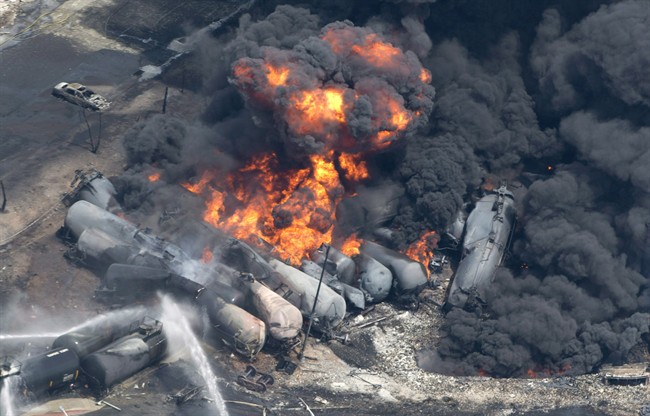When the Lac Megantic decision came down, finding all three defendants not guilty of all criminal charges, listener reaction ran the full spectrum.

Lara said it was the right decision because those who really needed to be held accountable were the the company brass and regulators. Another listener – a former train operator himself – was appalled, saying it sent the wrong message on safety practices and training for employees. Larry suggested that if it was a pipeline explosion that killed 47 people, there would have been a different outcome.
LISTEN: Danielle reads some listener comments on the Lac Megantic verdict
Larry may have a point: the BP Deepwater Horizon explosion that killed 11 workers did have a different outcome. BP pleaded guilty to 11 felony counts for the deaths; Transocean pleaded guilty to a misdemeanor.
Criminal charges were filed against multiple employees, though none resulted in any prison time. Anthony Badalementi was sentenced to one year probation, Donald Vidrine received 10 months probation, and Kurt Mix received six months probation. The companies involved also paid billions of dollars in fines and settlements.

Get daily National news
It may seem remarkable that there were no criminal convictions in Lac Megantic when the consequences were so much worse: 47 people have been declared dead but the bodies of five were never found, presumed vaporized on contact.
Three former Montreal, Maine and Atlantic employees – engineer Tom Harding, rail traffic controller Richard Labrie and operations manager Jean Demaitre – were implicated in the disaster and it was telling that the jury took nine days to reach a verdict, having to ask the judge for clarification on his instructions twice.
LISTEN: Danielle Smith and defence lawyer Ari Goldkind discuss Lac Megantic trial
Earlier in the week, I spoke with defence lawyer Ari Goldkind to understand why the jury was having so much trouble. In walking through the aspects of the case, it seems reasonable to conclude that the jury may have thought the wrong people were on trial.
Poor equipment and poor practices at the company, poor regulatory oversight by the Canadian Transportation Agency, and the inadvertent disabling of the air brakes when firefighters had to shut down the engine after a fire broke out, appear to bear some of the blame too.
In short, the series of unfortunate events that unfolded could not be solely laid at the feet of the three accused.
WATCH BELOW: Father of Lac-Megantic victim happy with verdict

Whether the jury made an error in failing to hold the engineer Tom Harding to account – though he maybe not be solely to blame, it is fair to say he is the one person who could have prevented the disaster – is likely to be the source of much debate in the days to come.
Having parked on a stretch of track with what is considered a steep grade, he only engaged seven handbrakes and he incorrectly tested them to see if they would hold. Had Harding made different decisions that night, the ensuing tragedy might never have happened.
Do you think the jury made the right decision?






Comments